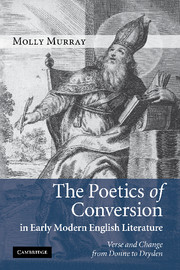Book contents
- Frontmatter
- Contents
- Acknowledgments
- Note on the text
- Introduction: toward a poetics of conversion
- 1 William Alabaster's lyric turn
- 2 John Donne and the language of de-nomination
- 3 Richard Crashaw and the gender of conversion
- 4 Versing and reversing in the poetry of John Dryden
- Afterword: Eliot's inheritance and the criticism of conversion
- Bibliography
- Index
2 - John Donne and the language of de-nomination
Published online by Cambridge University Press: 04 August 2010
- Frontmatter
- Contents
- Acknowledgments
- Note on the text
- Introduction: toward a poetics of conversion
- 1 William Alabaster's lyric turn
- 2 John Donne and the language of de-nomination
- 3 Richard Crashaw and the gender of conversion
- 4 Versing and reversing in the poetry of John Dryden
- Afterword: Eliot's inheritance and the criticism of conversion
- Bibliography
- Index
Summary
Two young poets joined the Earl of Essex on his expedition to Cadiz in 1596. Shortly before this voyage, or shortly after it, both poets converted, but in opposite directions: one became a Catholic, the other a Protestant. This is not the only difference between William Alabaster and John Donne. If Alabaster's sonnets celebrate the vertiginous rapture of spiritual motion, much of Donne's poetry registers his own changeability with regret or even disgust. In a verse letter to the Countess of Bedford (“On New-Yeare's Day”), Donne describes himself as “meteor-like, of stuffe and forme perplext, / Whose what and where in disputation is” (2–3). Such mutability creates a crisis of self-representation, a predicament acknowledged in the poem's next line: “If I should call mee any thing, should misse” (4). This idea of inevitable mis-designation recurs throughout Donne's religious writings, in which the identities of the true believer and the true church – especially in a time of ongoing “disputation” – become equally hard to pinpoint. The Holy Sonnets, in particular, seem to reflect the superimposition of two kinds of perplexity, the personal and the ecclesiastical. In Sonnet 19, for instance, Donne's speaker acknowledges a “constant” tendency to “change in vowes and in devotion,” even when he “would not” (3–4). Elsewhere, he implies that this confusion is produced, or at least enabled, by the proliferation of devotional possibilities.
- Type
- Chapter
- Information
- The Poetics of Conversion in Early Modern English LiteratureVerse and Change from Donne to Dryden, pp. 69 - 104Publisher: Cambridge University PressPrint publication year: 2009



